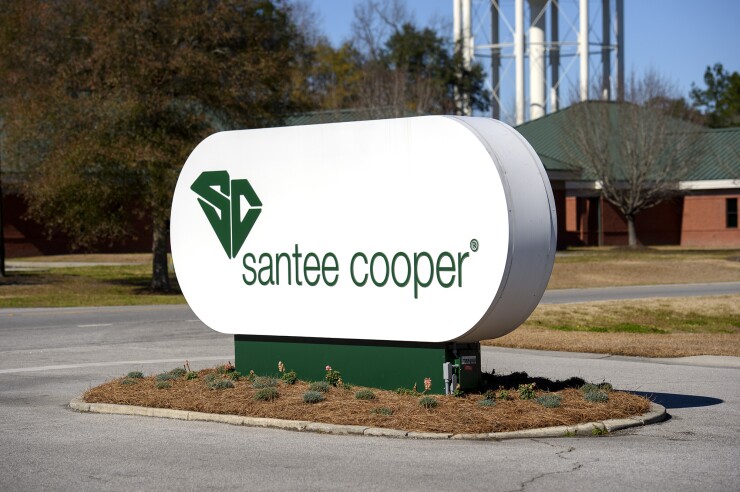Want unlimited access to top ideas and insights?
An investor in Santee Cooper’s "Mini-Bond" program has sued the South Carolina-owned utility alleging that the unrated debt was sold at artificially deflated interest rates at a time when details about its troubled nuclear project were hidden from the public.
Murray C. Turka filed

Turka, who requested a jury trial, also wants the U.S. District Court of South Carolina’s Charleston Division to designate the litigation as a class-action suit.
“Santee Cooper elected not to disclose material information,” said the 45-page complaint filed on April 15. “Defendants knew the nuclear project was in jeopardy for years prior to announcing its abandonment. Defendants chose to actively conceal this information from Mini-Bond holders.”
Santee Cooper has issued mini-bonds in small denominations directly to South Carolina residents for years, with official statements saying that the proceeds were being used to fund capital improvements. Such mini-bond programs are often seen as a way
During the period questioned in the lawsuit, the authority issued mini-bonds in 2014, 2015 and 2016 totaling $117.8 million. Turka certified that he purchased $15,000 of the bonds in 2014.
Santee Cooper’s mini-bonds may not be covered by federal securities law, according to a securities lawyer who spoke on the condition of not being identified.
“It’s unclear whether [Santee Cooper] intended for this to be an intrastate offering and exempt from federal securities law,” said the lawyer, who reviewed the suit and official statement for the 2016 mini-bonds. “They don’t say that and they don’t really discuss the nature of the offering, so it’s hard to come to a conclusion about whether they intended for these to be exempt from federal securities law.”
According to the official statements during the period questioned in the suit, no broker-dealers were involved and no CUSIPs were assigned to the bonds that were sold.
“A direct sale to purchasers and the absence of the broker-dealer removes some of the usual disclosures required in Rule 15c2-12 or other features that are involved in a public offering,” the securities lawyer said.
Interest rates for the 2014 bonds ranged between 1.75% and 4.3%, and they mature between 2019 and 2033. Interest rates for the 2015M bonds maturing between 2020 and 2024 ranged from 1.75% to 3.85%. For the 2016M bonds, which mature between 2021 and 2035, interest rates ranged from 1.65% to 3.75%.
"Plaintiff and the other members of the Class would not have purchased Santee Cooper Mini-Bonds at the promised interest rates, or at all, if they had been aware that the interest rates had been artificially and falsely depressed by Defendants’ misleading statements," the lawsuit says.
The suit said the nuclear project was “hopelessly” behind schedule, but utility executives disclosed nothing to mini-bond investors despite having an assessment by Bechtel Corp. by October 2015 that determined there were “significant issues” facing the construction of the two nuclear reactors that threatened their completion.
There were several iterations of the Bechtel assessment, which the suit claims were edited to soften wording and remove a new schedule of completion because the work would be done several years after the Jan. 1, 2021 deadline promised to investors.
The deadline to bring the reactors online was originally intended to qualify Santee Cooper for federal tax credits that would help the utility fulfill debt obligations, the suit said.
SCANA, the parent of the project’s majority stakeholder South Carolina Electric and Gas, and Santee Cooper paid Bechtel $1 million for its assessment, “yet the Bechtel Reports’ conclusions and the critical underlying facts they discussed were hidden from ratepayers, investors and regulators until the nuclear project collapsed in mid-2017,” the suit said.
The defendants violated 10(b) of the Exchange Act and Rule 10b-5 by using “devices, schemes, and artifices” to commit defraud, made untrue statements of material facts or omitted material facts, and engaged in acts, practices, and a course of business that operated as a fraud or deceit on the plaintiff and others similarly situated, the suit alleges.
On April 18, Santee Cooper voluntarily disclosed the Turka lawsuit to its traditional municipal bondholders. The authority has more than $4 billion in bonds that were issued to pay for constructing the reactors before the project was canceled.
The move has led South Carolina’s governor and legislators to examine selling the utility to shed the debt.

About $259 million of current interest and capital appreciation mini-bonds were outstanding as of Dec. 31, 2018. The utility discloses its financial and most investor communiques
Some newer mini-bond programs are structured differently than Santee Cooper’s.
The city of Cambridge, Massachusetts issued $2 million of mini-bonds in 2017 with a five-year maturity and $2.5 million of five-year mini-bonds in 2018 to fund capital projects.
They were rated triple-A by Fitch Ratings, Moody's Investors Service and S&P Global Ratings.
In both cases the debt was sold initially to city residents. Neighborly Securities was the underwriter and CUSIPs were assigned to the bonds. Disclosures are released on EMMA.
The official statements for Cambridge’s mini-bond issuances also contain continuing disclosure obligations required in Securities and Exchange Commission Rule 15c2-12. Its status as the first-ever online sale of small denomination bonds that cleared through the Depository Trust Clearing Corporation, bringing the mini-bonds more comparable to traditional municipal debt, were factors in the transaction's winning The Bond Buyer's
According to the securities lawyer who spoke to The Bond Buyer, the SEC hasn’t addressed the use of mini-bonds recently.
“They are quite often viewed as sort of retail investment in a positive aspect,” the lawyer said.
But the complaint filed by Turka said each of the official statements for Santee Cooper’s mini-bonds listed identical risk factors regarding the nuclear project.
The official statements said that construction of large generating plants involved “significant financial risk” and that delays or cost overruns may be incurred as a result of those risks.
“But these ‘risk factors’ were anything but risks,” the lawsuit said. “Defendants knew at the time the official statements were issued that the risks had already eventuated.”
Long before the nuclear reactor project was canceled on July 31, 2017, SCANA and Santee Cooper knew there were problems, the complaint said, adding, “It quickly became clear that this was no innocent business failure; rather, it was radical and indefensible mismanagement.”
In the fall of 2015, Santee Cooper executives met with their attorneys regarding Bechtel’s early assessment of the project’s status. Evidence included in the suit from that meeting includes a copy of a piece of paper on which an unidentified individual wrote, “POS/OS Mini-Bond, Bechtel assessment, disclose or not.”
While the lawsuit is in its infancy, Santee Cooper’s position on whether the mini-bonds are subject to securities laws and disclosure obligations will become clearer as the agency responds to the suit, the securities lawyer said.
“In programs where Mini-Bonds are offered strictly to direct purchasers they may not have the protections of the securities law that adding a broker-dealer with responsibilities under rule 15c2-12 adds to such a transaction,” the lawyer said. “Where we’ll see meat put on the bones is in a motion to dismiss or a motion for summary judgment.”





